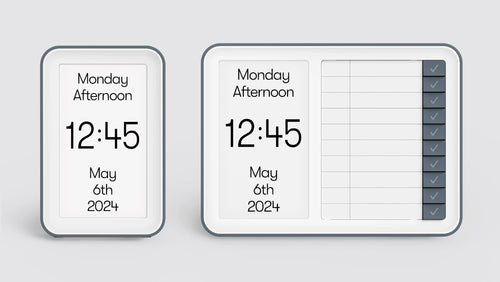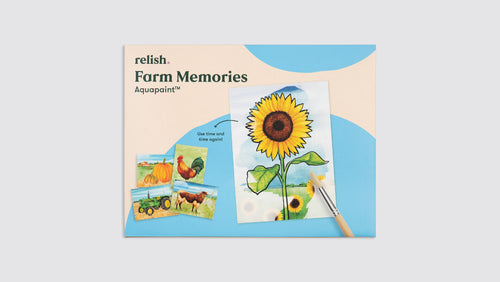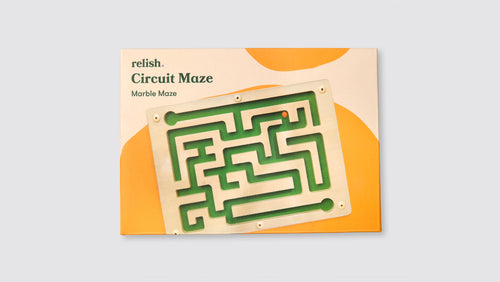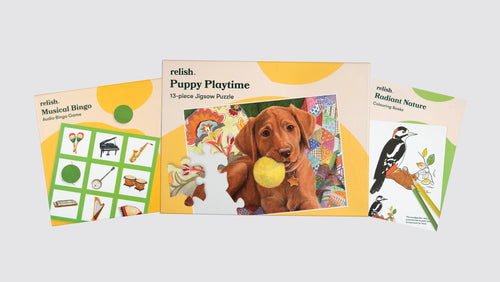There is currently no way to stop dementia from progressing. While that may be the reality, it is important to be aware that there are plenty of ways for people living with dementia to maintain a healthy lifestyle that will help with how they feel while living with dementia. Medical professionals and researchers highlight that making conscious decisions toward wellness can help people with dementia remain stable, safeguard their mental health, and stay as healthy as possible.
If you’re somebody living with dementia, a carer, or a family member of someone with dementia, it can be useful to learn about various activities that help people with dementia to feel good and build up a strong sense of wellbeing and self-confidence, regardless of the stage that they are at. Activities and pastimes that were meaningful to people living with dementia in the past will always remain joyful and significant to them.
There is a wide range of meaningful activities you can partake in to improve wellbeing that focuses on the following:
- Social interaction
- Communication
- Validates identities
- Physical activity
- Good nutrition
- Compensates for lost abilities
- Improves self-esteem
- Maintains existing abilities and skills
It’s key to appreciate and understand the person who has dementia to help them plan appropriate activities, such as considering the person’s lifestyle preferences, employment, recreational activities and life events.
Read on to learn meaningful ways to improve the lives of people with dementia.
1. Take Pleasure in Music
Music is glorious, with each song and tune offering a nostalgic familiarity that can spark significant joy. Music has the power to really reduce anxiety and improve the mood and cognitive function of people living with dementia. People at all stages, including those with late-stage Alzheimer's, can enjoy moving their bodies to a familiar beat. Try singing in a group, belting a tune alone, or even guessing music. Playing an instrument can even delay the onset of cognitive decline.

2. Enjoy Nostalgic Tokens and Photographs
Looking through photographs, videos, tokens from travel, agendas, or even journals from the past can support someone living with dementia to prompt pieces of their identity and remember happy times from the past.
Doing this can conjure up those fuzzy, happy feelings of familiarity, comfort, and positivity. Roll Down Memory Lane is an enjoyable way for a person with dementia to reminisce, as it helps with confidence and bonding with family.
3. Spend Time With Animals
Pets are compassionate and very in tune with human emotions. Spending time with a beloved pet can relieve agitation, anxiety, and depression and improve mental health. Pets can be a fantastic way to help someone living with dementia interact with the world a little more through walks or attending training. Sitting and stroking a cat or a lap dog can be a sensory experience full of joy for many pet lovers.
Buick Hamblin, counsellor and psychotherapist, says ""spending time with animals has a profound impact on dementia well-being. The simple act of petting or interacting with an animal can stimulate memories and emotions, promoting mental engagement, reducing anxiety, and enhancing feelings of comfort and joy."
4. Feed and Watch Birds
Heading outside and simply breathing in the fresh air is calming. But when you add in the wonder of wild birds, feeding and watching them can offer physical and cognitive stimulation, helping with stress reduction, enhanced mental health and reduced anxiety. Connecting with nature is a simple and easy pleasure that can bring a smile to a loved one’s face.
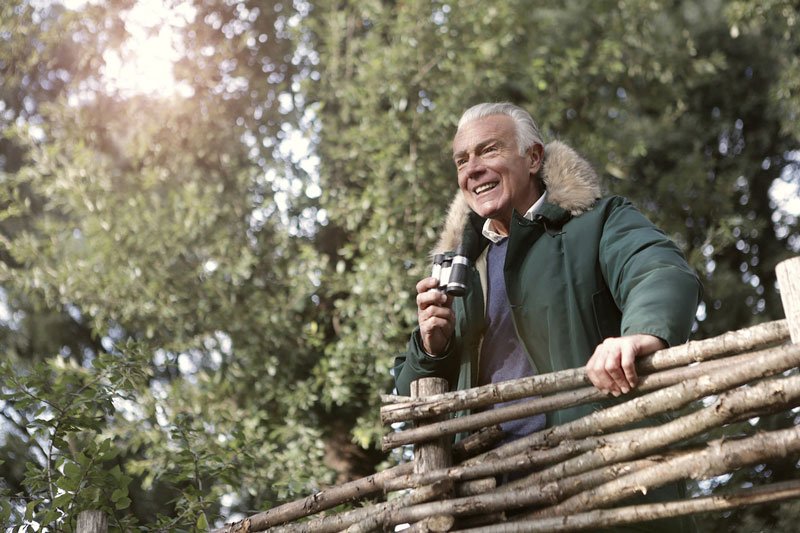
5. Exercise
Exercising, in any capacity that feels good, does wonders both physically and cognitively. Physical activity supports the brain in keeping blood flow active and increasing chemicals that protect the brain. Getting outdoors is the best way to do it when you can.
For those in the early-mid stages, weightlifting, swimming, playing bocce ball, dancing, outdoor gardening, and walking are excellent ways to get moving. All of these exercises support memory, flexible thinking, and self-control and improve attention.
For those in the mid-late stages, chair exercises, gardening, tai chi, table bowling, and walking are excellent ways to exercise and support decision-making, memory, and reasoning.
6. Try Puzzles, Word Games and Quizzes
These types of games can keep brains active and encourage problem-solving, memory, social interaction and hand-eye coordination. What’s more, playing games in a group or as a family can be a wonderful way to spend time together. We recommend the following games:
- Board games, like Snakes & Ladders and Ludo
- Marble mazes - this is particularly good for those in the mid-later stages
- Sudoku
- Word puzzles, such as Wordsearch
- Jigsaw puzzles
- Quizzes with a topic that interests the person
- Card games, like Animal Snap
See our full range of dementia-friendly games.
7. Experience Different Textures
Novel, unique and different textures can provide meaningful stimulation while helping with memory. There are many textures you touch, such as the soft fur of an animal, damp soil or leaves, fabrics, and more, that can remind you of familiar memories. This can be exceptionally comforting for someone with dementia.
Our Tactile Matching Game is a great way to reconnect with memories, increasing feelings of trust and relaxation, particularly for those in the later stages of dementia.
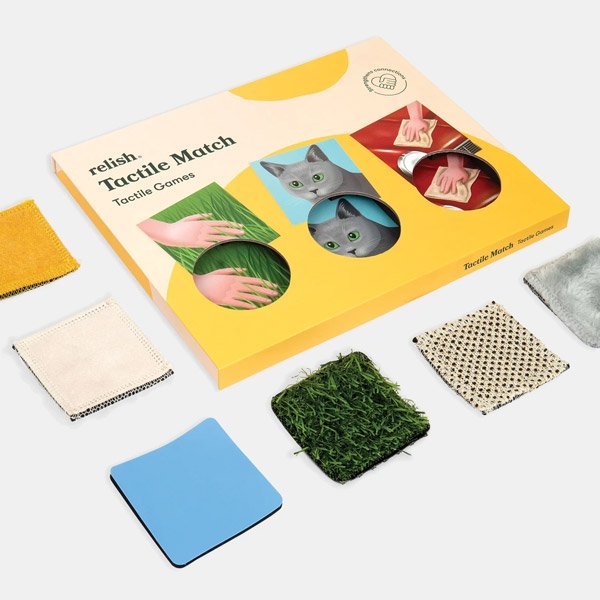
8. Practise Yoga and Meditation
Doing yoga and meditation regularly can support stimulating the brain with neuroplasticity and help the brain form new connections as it uses different areas of the brain. Both help to soothe and regulate stress while supporting the central nervous system and the body’s stress response. Mindfulness practices support memory and reduce cognitive decline.
Yoga and meditation are great for dementia and mental health. It's also an excellent practice to include if you are a carer, as it helps reduce stress.
Furthermore, caregivers who practise yoga and are, therefore, less stressed are in a better position to provide optimum care to those they love.
We've partnered with Breethe, a popular meditation and wellness app that helps to support people with dementia in their daily struggles with stress, anxiety, sleep, and more. Receive 20% off a Breethe membership when you sign up to the Relish newsletter.
9. Complete Household Tasks
Meaningful activities can include household tasks. Accomplishing small jobs around the house can help people living with dementia feel included, satisfied, and supported with independence. Simple household tasks for a person with dementia include:
- Washing dishes
- Setting the table
- Dusting
- Preparing food
- Sweeping the floor
- Sorting mail and clipping coupons
- Sorting socks
- Folding laundry
10. Get Creative
For people living with dementia, arts and crafts are a great way to reduce stress. It helps stimulate all five senses, improve memory, create new connections between brain cells, and connect with others. There are plenty of creative things you can do, such as:
- Painting - our Aquapaints are great for this!
- Making a colourful mural
- Doing some doodling
- Creating handmade cards to offer loved ones
- Making beaded bracelets
- Sculpting with play dough, and more!
Check out our dementia-friendly creative product range - ideal for art lovers.
Promote Better Wellbeing For Your Loved One With Relish
When it comes to living well with dementia, pick activities and projects that are fun, easygoing, and stress-free. If there is too much pressure involved, it can lead to frustration and sadness. There is no one size fits all approach when it comes to this, so it should be planned based on person-to-person. Activities should always match their ability, be easy to follow, and be in conjunction with their skill set and personal interests.
If you are seeking dementia-friendly products to enhance wellbeing, check out Relish’s wide range of Alzheimer's and dementia products that cover a wide range of activities focusing on wellness and happiness while encouraging growth and discovery.
